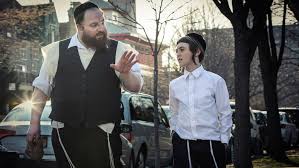
This is a Yiddish language film featuring nonprofessional actors shot on location in Brooklyn and a peek into a culture very few get to see from the inside. This film, making Hasidic Jews the subject of the story is unusual, since they typically want nothing to do with pop culture and entertainment. Menashe Lustig, who plays the title character, had never set foot inside a movie theater before being cast as the lead. Mr. Lustig has, however, been in front of the camera on several occasions, starring in his own YouTube comedy shorts.
Menashe is a heartwarming, fictional story told in documentary style. Director Joshua Z. Weinstein has previously crafted documentaries in India and South Africa. Even though he speaks no Yiddish, he pushed on with this project. With the help of Daniel Finkelman, a music and video producer with ties to the Hasidic Community, Weinstein was able to find his cast.
Menashe is struggling on all fronts. His wife recently died, and under the strict rules of the Othodox sect, his young son is not allowed to live under his roof until he remarries. The youngster lives with the wife’s family who are no fans of Menashe’s parenting skills.The son is played by Ruben Niborski whose parents from Israel both speak Yiddish. Ruben may well be the only cast member who has actually seen a feature movie before appearing in one. Meanwhile, Menashe is barely making a living working in a Brooklyn grocery store for a taskmaster boss.



Despite this bleak landscape, Menashe, finds plenty of comedy. Whether it’s the interplay with his definitely non-Hasid, non-Jewish co-workers or interviewing potential new wives, Menashe Lustig has a aura of basic decency and a little glimmer in his eyes that keep the audience rooting for him to succeed, get a new wife and have a happy life.This is a film filled with both humor and poignant moments. The scene where he pleads with the Rabbi to keep custody of his son is a standout moment that could have you tearing up. The man who plays that Rabbi is actually is a cabdriver who had always dreamed of being in a powerful position. Here, he finally gets his moment.
For those who think Yiddish is a dead language, think again. Before World War II there were millions of Yiddish speakers. The Jews of Eastern Europe brought it with them to the United States. From 1930 until 1950 about 40 Yiddish features and shorts were released. There was even a thriving Yiddish theater in New York where some well known performers got their start before crossing over into mainstream entertainment.
Today a few hundred thousand Yiddish speakers remain. It’s comprised of mostly Orthodox Hasidic Jews and others who want to keep the language alive. Recent times have seen a slight resurgence in Yiddish film. Most notably The Coen Brothers’ “A Serious Man” in 2009 and even a Yiddish “Romeo and Juliet” in 2011.
This is a very human look at a very strict religious sect with lots of rules for how their members should live. There are reasons for everything, but many are considered outdated or interpreted differently. And even though most, not all, orthodox Jews wear black coats and wide brimmed black hats, this is not a movie dealing with issues in black and white. It is a sometimes emotional, eye-opening treatise showing the tough, gray area decisions religious people like Menashe have to deal with in today’s world.
A-24 82 Minutes PG









